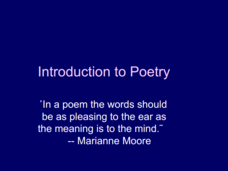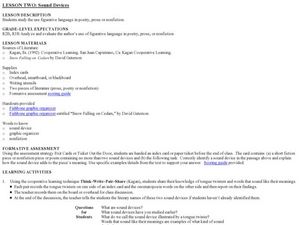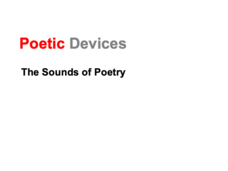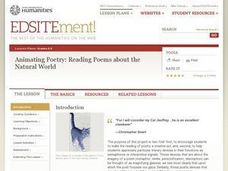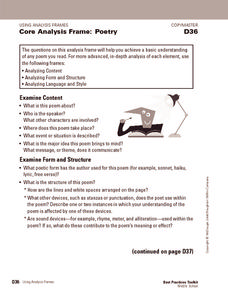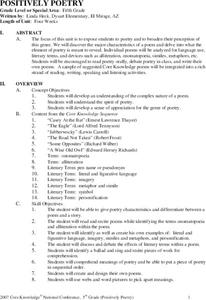EBSCO Industries
Music and Poetry
Song lyrics, like poems, are meant to be heard. After examining the literary devices in several poems, scholars examine the lyrics of popular songs and identify the sound devices and the figurative language writers use to create the...
Curated OER
Figurative Language & Poetic Devices Activity: Firework by Katy Perry
Sure to engage your class in poetry, this resource requires them to identify, label, and explain poetic devices and figurative language used in Katy Perry's hit song "Firework". A well-organized page that chunks the lyrics so learners...
Poetry4kids
Onomatopoeia Poetry Lesson Plan
Two exercises boost scholars' knowledge of a onomatopoeia with excerpts from famous poems. In exercise one, participants circle onomatopoeia words. Exercise two challenges writers to choose three words to use in an original poem.
Curated OER
Introduction to Poetry
What makes a poem a poem? Give your class a basic understanding of some of the different aspects of poetry by showing them a slide show of poetic devices and elements. The presentation is quite long, so you might split it up into a few...
California Federation of Chaparral Poets, Inc
Poetic Devices
Have everything you need to know about the elements of poetry with a nine-page handout. Split into four categories—word sounds, meanings, arrangement, and imagery—budding poets may reference terms, read definitions, descriptions, and...
Curated OER
Poetry Notes
Break this presentation into two or three days so as not to overwhelm your kids. Fifty-four slides is a lot of slides, but the PowerShow is well-organized, and terms are defined clearly and illustrated in examples provided. A general...
Curated OER
Poetry: "The Poplar Field" by William Cowper
Explore poetry analysis. Learners read the poem "The Poplar Field" by William Cowper, answer a series of questions, and discuss literary devices. It is a terrific way to help your class understand how to read and understand poetry.
Curated OER
Sound Devices in Poetry, Fiction and Nonfiction
Students examine the impact of sound devices in poetry. In this poetry lesson, students read the listed poems and identify uses of alliteration, repetition, consonance, rhythm, rhyme, and slang. Students discuss how sound devices enhance...
Curated OER
Sound Devices
Learners examine the impact of sound devices in poetry, prose, and non-fiction. In this figurative language lesson, students read instructor-selected literature and identify uses of alliteration, repetition, consonance, rhythm, rhyme,...
Curated OER
Unknown Frost Poem Discovered
What? A long-lost poem from Robert Frost? Introduce your class to a poem recently found and published from Robert Frost's personal collection. The lesson includes background information on the author, the poem itself, and a list of...
Ereading Worksheets
Poetic Devices: The Sounds of Poetry
Students review examples and definitions of different poetic devices. In this poetic devices lesson, students interact with the website by reading definitions and looking at examples of poetic devices such as onomatopoeia, repetition,...
Curated OER
Reading Poetry
Present your class with an overview of poetry-related information. The slides are clearly organized by topic, starting with reading poetry, ending with myths, and touching on everything from the five senses to open and closed forms of...
Prestwick House
Discovering Genre: Poetry
Work on literal and figurative meanings with a lesson plan focused on Robert Frost's "After Apple-Picking" and "The Road Not Taken." Readers identify the literary devices used by the poet to set the poems' themes, settings, and narrative...
National Endowment for the Humanities
Animating Poetry: Reading Poems about the Natural World
Middle schoolers complete poetry analysis activities. In this poetry analysis instructional activity, students consider the use of imagery and sound devices in poetry. Middle schoolers translate poetry into another art, read a diverse...
Houghton Mifflin Harcourt
Core Analysis Frame: Poetry
Dig deep into any piece of poetry with a set of analysis questions. Ponder the content, form, and language of poetry and provide some question for critique. The first two pages include general questions, and the remainder of the document...
Georgia Department of Education
Exploring Poetry and Poets
Combine the study of poetry and non-fiction texts with this complete and ready-to-use six-week unit. After reading numerous poems from local writers and compiling a personal anthology, high schoolers find and read a memoir or biography...
Tech Coach Corner
Poetry: It's Rhyme Time!
Define poetic devices and provide examples. The slides list information for rhyme, repetition, alliteration, simile, metaphor, free verse poetry, onomatopoeia, and patterned poetry. The animation and sounds are a bit distracting, and...
Curated OER
Elements of Poetry
Prepare your learners to identify figurative language in poetry. Tips for reading poetry and what to look for are listed on these slides. Rhetorical devices are defined and plenty of examples are given.
Curated OER
Japanese Poetry: Tanka? You're Welcome!
Students explore tanka, a form of Japanese poetry. They read and analyze tankas to determine the structure and intent, and compose a traditional and a non-traditional tanka.
Curated OER
Poems
Thud! Squiff! Create sound effects with words. Introduce your youngsters to onomatopoeia with these fun, rainy-day poems. They write down sound words, discussing rhythm and rhyme. You can also incorporate the author's use of capital...
Macmillan Education
Understanding Poetry (Elementary)
Introduce young readers to poetry analysis with a learning exercise that uses Emily Bronte's "Spellbound" to model how poets use word choice, the sounds of words, the repetition of words, and rhyming patterns to create the mood, tone,...
ETFO
Free Verse Poetry Rubric
Follow poetry instruction with a four-category rubric designed to guide budding poets' writing of free verse poetry.
Curated OER
Positively Poetry
Students complete a unit on poetry. In this poetry lesson, students complete 19 lessons that focus on reading and writing poetry as well as learning about literary elements and sound devices. Students read poetry orally, debate poetry in...
Curated OER
Figurative Language in Poetry and Prose
Students examine the impact of sound devices in poetry. In this poetry lesson, students read the listed poems and identify uses of hyperbole, simile, metaphor, imagery, and personification. Students discuss how sound devices enhance poetry.





